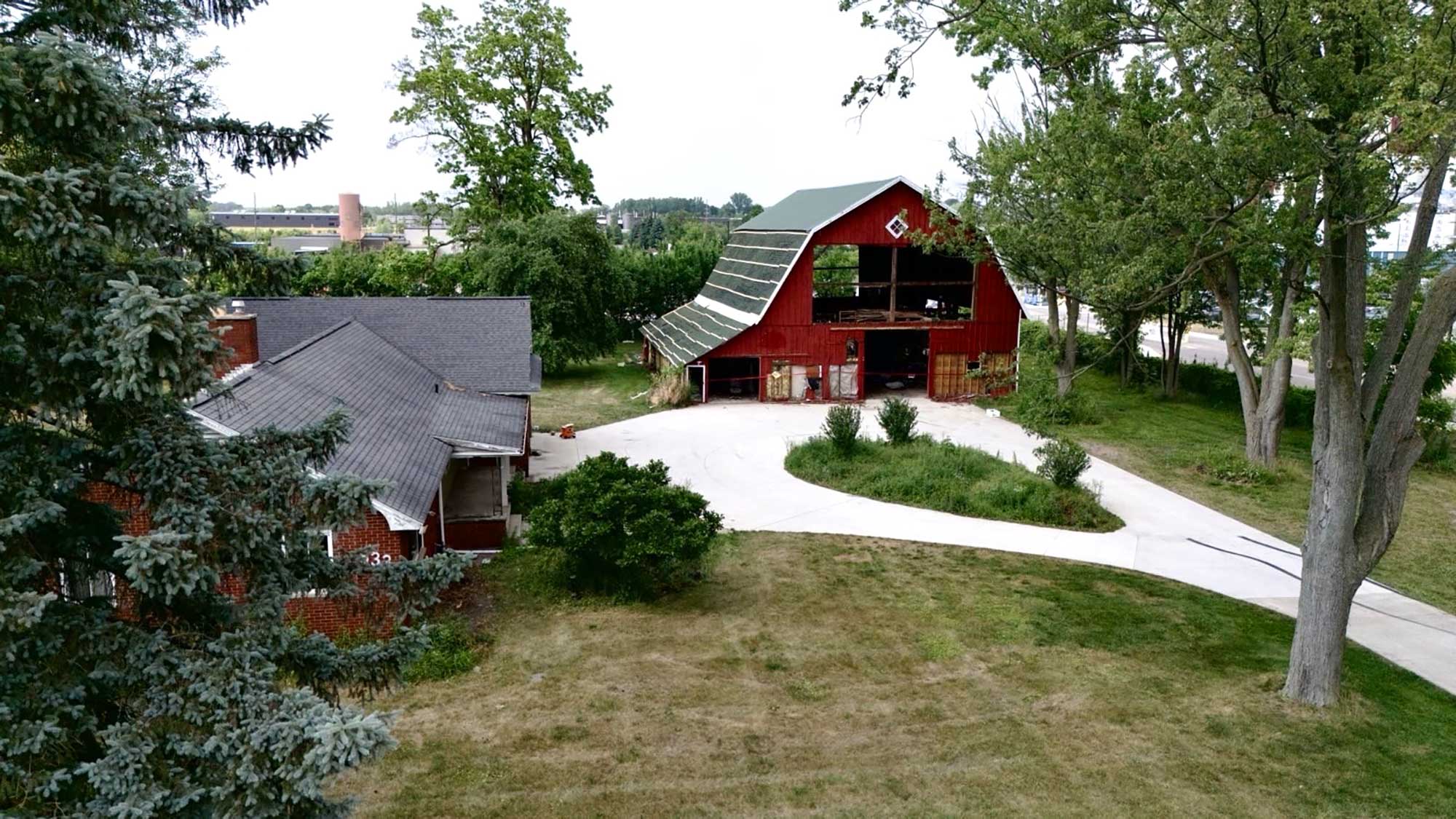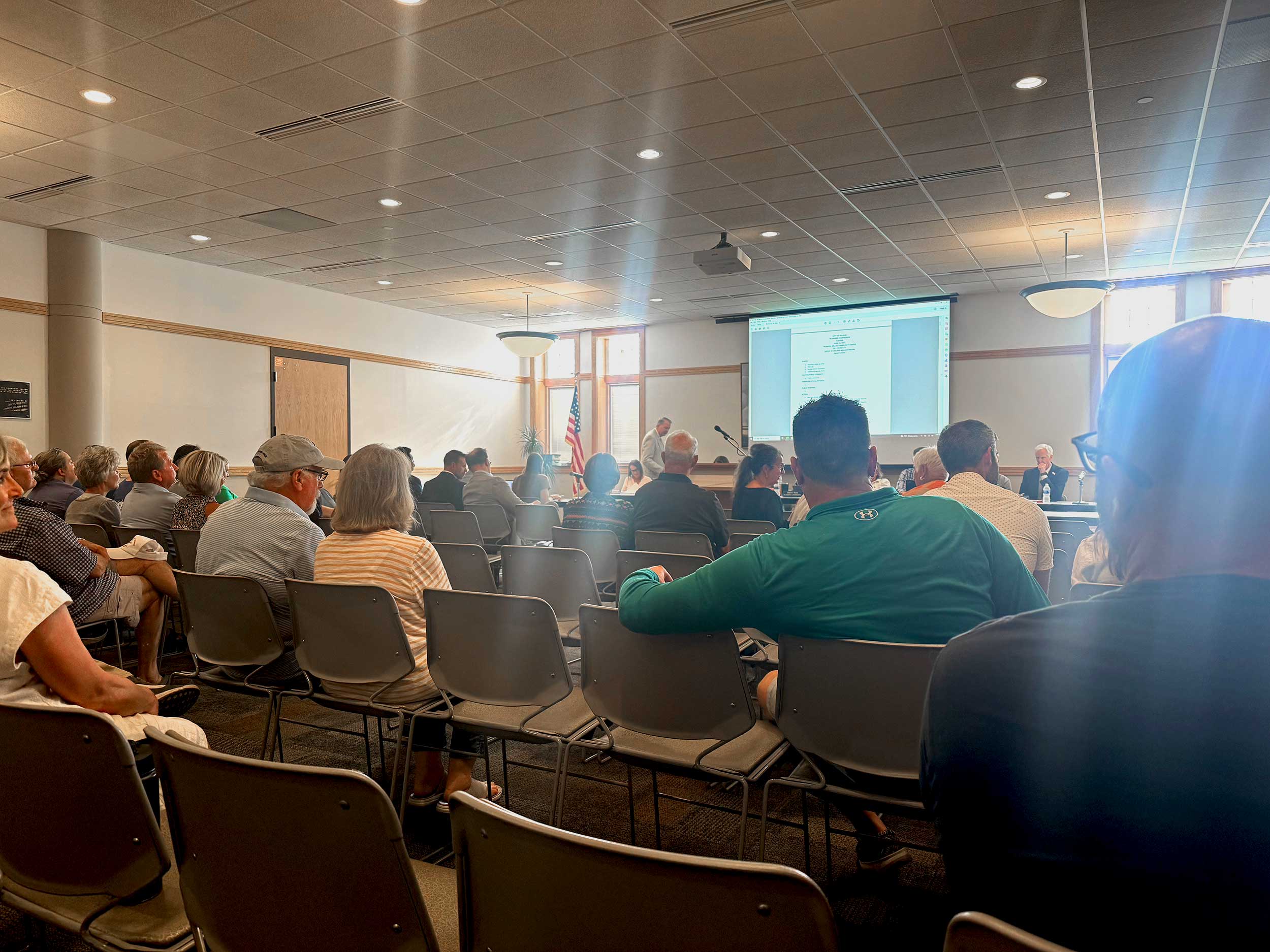

While the room still buzzed with energy and agitation, a few more open seats were noticeable compared to previous meetings. This might this be a shift in pace, but not in passion. Many attendees were seated, but others chose to stand along the walls or linger in the back. This sustained community turnout reflects ongoing concern and debate that has only intensified in recent weeks.
The Rundown
The Mead-Johnson modernization and expansion project is estimated to cost $836 million. It requires that two neighboring parcels of land, 605 and 633 E. Main Ave, which are currently residential zones, be converted to industrial zones in order to make way for the project. These zones contain a single-family dwelling as well as eight townhomes.
Local residents have offered mixed reviews of the project. Many are concerned about surface issues such as bustling traffic, noise, emissions, industrial lighting, and environmental consequences, though some have noticed a lack of transparency and integrity demonstrated by Mead-Johnson executives.
A shared skepticism cautions against allowing this rezoning’s approval, due to the fact that the proposed site plans are far too conceptual to be considered. One resident expressed, “We don’t want promises.”
Some residents have already sold their properties to make the project possible. Still, there are residents who have held out on handing over their home. Margie and Earl Klein, a couple whose home resides on 633 E. Main Ave, refuse to sell. In an interview with another newsource she explains, “We love our place, but we don’t want to sell to Mead-Johnson because they are pushy and demanding.”

In a previous meeting, Justin Griner, a Mead-Johnson representative, expressed that the company would be forced to seek land elsewhere if the rezoning application is denied. He expressed, “We’ve been asked whether rezoning is needed to achieve our modernization goals. The answer is yes. If our rezoning request is denied, we will be unable to make these investments in Zeeland and will be forced to take them elsewhere.”
The fate of this issue marinated for two weeks until commissioners, the public, and corporation executives gathered once again to hear of a decision.
The Community Holds its Breath
Before commissioners revealed their decision, the public was offered a chance to express their final concerns.
First to stand behind the podium, a resident by the name of Bruce, opened his comment with a hook. He drew a parallel to a Tennessee Volunteers quarterback who demanded a raise in NIL deals—threatening to leave the team if his demands weren’t met. The team’s coach refused to give in to the quarterback’s demands and ultimately removed him from the team. In his comment, Bruce stated, “[The coach] risked his job. He risked the team’s success. But he stood by a principle: the team is bigger than any one player.” Doesn’t this sound familiar?
He continued, “I hope each of you has the courage, like that football coach, to say, 'Zeeland is bigger than any of us.'” He finished his statement with this: “And as I look at you all today, I want to say this: No one is bigger than Zeeland.”
Colin, another concerned resident, explained, “I understand there’s pressure to move quickly. I’ve heard concerns that Mead-Johnson may walk away if this proposal doesn’t move forward. But let’s be honest, Mead-Johnson has already acquired nearly all the properties involved—often paying above market value. And they’ve publicly stated that they have no interest in leaving Zeeland.” He went further to discuss the legalities of the decision, stating, “So tonight, I’m asking you to follow the law, follow the advice of legal counsel, and restart this process to protect the integrity of the outcome.”
After closing public remarks, the commissioners had a moment to share their thoughts. Commissioner Glenn Kass expressed his heartfelt struggle stating, “I’ve lost sleep over this” and “I want to believe there’s a path forward where we don’t have to sacrifice one value for the other.”
Other commissioners alluded to the underlying economic advantages that come from the project.
Commissioner Kevin Klynstra brought this to light stating, “Once abatements expire, Mead-Johnson will pay taxes equivalent to what 1,800 homes would pay.” Residents in the crowd shook their heads in disbelief of what they were hearing. Klynstra quickly followed this statement with understanding: “Is losing homes my favorite thing? No. But if losing a few houses means keeping 500 good jobs here in Zeeland while dramatically increasing our tax base, then yes. I believe it’s worth it.”
Klynstra pointed out that other major local corporations have expanded into areas that technically conflict with existing zoning designations, yet the city has accommodated those changes over time. He insinuated that this issue is no different.
The Result
Due to conflicting interest, both Amanda Cooper and Robert Blanton recused themselves from voting on both motions due to their connections with Lakeshore Advantage, an economic development corporation that has been a supporter of the project.
The proposal to rezone 633 East Main Ave—a single-family residence to which Margie and Glen Klein reside—was unanimously approved.
The proposal to rezone 605 East Main Ave, which contains eight townhomes, was approved by a majority decision as it faced one opposing vote from Commissioner Glenn Kass.
As people slowly departed from the meeting, a weight of disappointment was written across their faces—quiet, heavy, undeniable.
For those who lost their homes—namely the Kleins—the heartbreak was palpable. You didn’t need to know them personally to feel it; the grief hung in the air.
In light of the approval, Mead-Johnson representative Aaron Holder expressed, “We are committed, though, to being a good neighbor.”
So what’s next?
With both rezoning requests approved, Mead-Johnson now moves forward with the next phase of its $836 million modernization plan. They will need to acquire further approval as this meeting only marked a preliminary approval.
While the commission’s decision clears a significant hurdle, it does not mark the end of public involvement or scrutiny. Upcoming developments are expected to draw continued community attention—particularly from residents who are at odds with the decision, such as the Kleins who remain steadfast in their refusal to sell. Their property now sits at the center of a growing tension between progress and principle.
In the meantime, questions linger over the specifics of Mead-Johnson’s plans, which many community members have labeled as “too conceptual.” The company has not yet submitted detailed site plans for the parcels. And residents have voiced concerns about how environmental impacts, traffic congestion, and quality-of-life issues will be addressed moving forward. The need for transparency and communication remains high.
Still, the community stands on the notion that “We don’t want promises.”

Sierra Ozolins is a West Michigan native, currently a student at Hope College. As an athlete, she is passionate about fitness—from running to weightlifting. With a interest for politics and lifestyle, she is intrigued how local culture, community, and everyday events shape the world around her—often with an iced coffee in hand and her dog by her side.